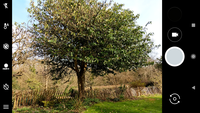
Photo from wikipedia
Simple Summary We investigated the contouring data of organs at risk from 40 patients with breast cancer who underwent radiotherapy. The performance of denoising-based auto-segmentation was compared with manual segmentation… Click to show full abstract
Simple Summary We investigated the contouring data of organs at risk from 40 patients with breast cancer who underwent radiotherapy. The performance of denoising-based auto-segmentation was compared with manual segmentation and conventional deep-learning-based auto-segmentation without denoising. Denoising-based auto-segmentation achieved superior segmentation accuracy on the liver compared with AccuContourTM-based auto-segmentation. This denoising-based auto-segmentation method could provide more precise contour delineation of the liver and reduce the clinical workload. Abstract Objective: This study aimed to investigate the segmentation accuracy of organs at risk (OARs) when denoised computed tomography (CT) images are used as input data for a deep-learning-based auto-segmentation framework. Methods: We used non-contrast enhanced planning CT scans from 40 patients with breast cancer. The heart, lungs, esophagus, spinal cord, and liver were manually delineated by two experienced radiation oncologists in a double-blind manner. The denoised CT images were used as input data for the AccuContourTM segmentation software to increase the signal difference between structures of interest and unwanted noise in non-contrast CT. The accuracy of the segmentation was assessed using the Dice similarity coefficient (DSC), and the results were compared with those of conventional deep-learning-based auto-segmentation without denoising. Results: The average DSC outcomes were higher than 0.80 for all OARs except for the esophagus. AccuContourTM-based and denoising-based auto-segmentation demonstrated comparable performance for the lungs and spinal cord but showed limited performance for the esophagus. Denoising-based auto-segmentation for the liver was minimal but had statistically significantly better DSC than AccuContourTM-based auto-segmentation (p < 0.05). Conclusions: Denoising-based auto-segmentation demonstrated satisfactory performance in automatic liver segmentation from non-contrast enhanced CT scans. Further external validation studies with larger cohorts are needed to verify the usefulness of denoising-based auto-segmentation.
Journal Title: Cancers
Year Published: 2022
Link to full text (if available)
Share on Social Media: Sign Up to like & get
recommendations!